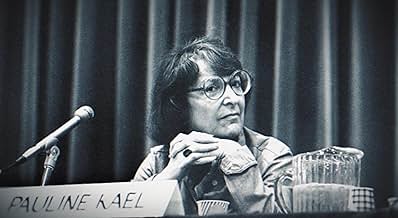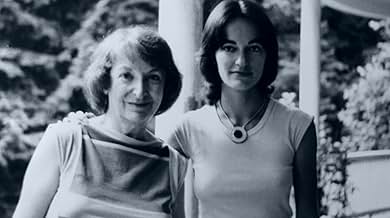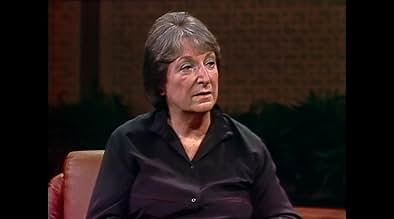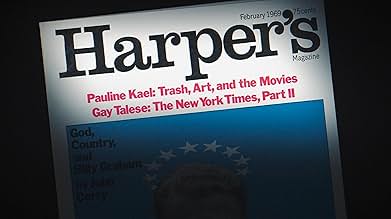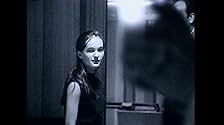What She Said: The Art of Pauline Kael
- 2018
- 1h 38m
IMDb RATING
6.8/10
1.1K
YOUR RATING
A portrait of the work and life of controversial film critic Pauline Kael, and her battle to achieve success and influence in the 20th century movie business.A portrait of the work and life of controversial film critic Pauline Kael, and her battle to achieve success and influence in the 20th century movie business.A portrait of the work and life of controversial film critic Pauline Kael, and her battle to achieve success and influence in the 20th century movie business.
- Awards
- 1 win & 6 nominations total
Pauline Kael
- Self - Critic
- (archive footage)
Phillip Lopate
- Self - Writer
- (as Philip Lopate)
- Director
- Writer
- All cast & crew
- Production, box office & more at IMDbPro
Featured reviews
Here's a documentary about film critic Pauline Kael. A movie about a movie critic! It seems an exercise in tail chasing.
For seemingly forever, including a couple of decades at The New Yorker, Pauline Kael was the outspoken voice of people who love an unseemly art. Movies, by their nature, cannot aspire to find that one, golden patron who will pay for their work. Instead, they must seek a mass audience, which means one must not be too hoity-toity. The business of movies is to make a product at a price that will entice enough people to pay for it to yield a profit. It's the same business model that a kid selling lemonade or Boeing making air craft uses.
If a critic has any purpose, it's to upbraid the movie producer who tries to slip bad films past an unsuspecting audience, to alert that audience to something that is unexpectedly good, and to do it in a manner that keeps people interested in her own, subjective opinion.... because it's all opinions, and it's all subjective... and ultimately, to let her audience know why: why this movie is good, why that movie is bad, why the third is junk, but good junk, and the fourth bad junk. She must be a prude and a pander, and enormously popular. And, to a certain extent, she must be feared.
All this Miss Kael did, with her world-weary attitude, her accessible, combative prose, her position as a reviewer for The New Yorker, and her books.
If this movie has any value, it's to alert people to the existence of Miss Kael's writing, to let them know that here's someone who has seen these films and might be able to tell them something that would enrich their understanding of them. Yet what matters about Miss Kael is not her life, or her rise to prominence. It's her writing. So read what she wrote.
For seemingly forever, including a couple of decades at The New Yorker, Pauline Kael was the outspoken voice of people who love an unseemly art. Movies, by their nature, cannot aspire to find that one, golden patron who will pay for their work. Instead, they must seek a mass audience, which means one must not be too hoity-toity. The business of movies is to make a product at a price that will entice enough people to pay for it to yield a profit. It's the same business model that a kid selling lemonade or Boeing making air craft uses.
If a critic has any purpose, it's to upbraid the movie producer who tries to slip bad films past an unsuspecting audience, to alert that audience to something that is unexpectedly good, and to do it in a manner that keeps people interested in her own, subjective opinion.... because it's all opinions, and it's all subjective... and ultimately, to let her audience know why: why this movie is good, why that movie is bad, why the third is junk, but good junk, and the fourth bad junk. She must be a prude and a pander, and enormously popular. And, to a certain extent, she must be feared.
All this Miss Kael did, with her world-weary attitude, her accessible, combative prose, her position as a reviewer for The New Yorker, and her books.
If this movie has any value, it's to alert people to the existence of Miss Kael's writing, to let them know that here's someone who has seen these films and might be able to tell them something that would enrich their understanding of them. Yet what matters about Miss Kael is not her life, or her rise to prominence. It's her writing. So read what she wrote.
10rzajac
This is an amazing labor of love.
Here's something to consider: I recently heard Quentin Tarantino say that he hated the fairly recent "biopic" genre craze because he felt that the biopic, as commonly understood and assembled, was a constraining format which only leads to cinematic disaster. His view was that if you want to regale us with the life of an amazing person, pick a key day or two in that person's life and tell the tale of that episode.
And I'm inclined to agree with him.
And... What She Said 1) manages to be a biopic, yet 2) cleverly, humorously, humanely uses an episodic treatment in order to sidestep the fate to which QT said biopics are inevitably consigned.
It... just... works.
And! It's enormously warm and darned FUNNY! If you love genuine, life-affirming wit, you'll be laughing from beginning to end.
Here's something to consider: I recently heard Quentin Tarantino say that he hated the fairly recent "biopic" genre craze because he felt that the biopic, as commonly understood and assembled, was a constraining format which only leads to cinematic disaster. His view was that if you want to regale us with the life of an amazing person, pick a key day or two in that person's life and tell the tale of that episode.
And I'm inclined to agree with him.
And... What She Said 1) manages to be a biopic, yet 2) cleverly, humorously, humanely uses an episodic treatment in order to sidestep the fate to which QT said biopics are inevitably consigned.
It... just... works.
And! It's enormously warm and darned FUNNY! If you love genuine, life-affirming wit, you'll be laughing from beginning to end.
Good documentary that brings its subject back to life in all her opinionated, maddening, sometimes brilliant, more often nasty, but always fun to read glory. My two caveats are that the plethora of talking heads, other than Kael's, are a bit on the dull side and, more importantly, that the overall tone tends toward the protective rather than the acerbic which would seem, in a work that deals with a famous critic, like the wrong way to go. Take, for example, the notorious evisceration of Kael by Renata Adler in the pages of the NYR, which caused, according to this film, great hurt feelings in its target. The attitude taken toward the incident by director Rob Garver seems to be the very non ironical "That was an unfair hit job" rather than the proper "She could dish it out but she couldn't take it." Give it a B.
When talking about Pauline Kael, her most severe antagonists have a hard time separating who she was from what she wrote. Don't get me wrong, I have in my library all of Kael's books. I collect books by other reviewers. I have to admit that I frequently loved a movie that she tore apart: 2001: A Space Odyssey is an example of one of many. But imagine reading only positive comments about your favorites. How dull would that be. This documentary is decently done, but it only scratches the surface of who she was. It did fill in some information about how she came to be as a critic. It gave us a bit of biographical information. The best parts were her interviews with various talk show people, like Dick Cavett. I did feel sorry for David Lean whose movie, Ryan's Daughter, she criticized to his face at a "friendly" gathering. I don't defend some of her animus, but I would recommend what another reviewer suggested. A good deal of her work is in print. Read that and judge.
"What she said: The Art of Pauline Kael"
A portrait of the work of controversial film critic Pauline Kael and her influence on the male-dominated worlds of cinema and film criticism.
Loved or hated her influence was undeniable.
Image.jpeg
Viewed at the 69th Berlin Film Festival 2019.
"What She Said --The Art of Pauline Kael", solemnly, compiled and fully packed with testimonials from a steady stream of prominent film personalities, directors, writers, publishers, other film critics, etcetera, by an obvious admirer, New York based Rob Garver, his first feature length film.
Among those seen in the film besides Kael herself at various points in her life are: directors Quentin Tarantino, Paul Schrader, Woody Allen, John Boorman, Peter Bogdanovich, and David Lean (Who was so crushed by her panning of his films that he retired from directing for several years!) actor Alec Baldwin, and half a dozen female film critics all commenting on how Kael influenced them one way or another. At one point Allen says that even though Pauline trashed some of his movies he valued her comments and insights and considered her to be the best critic around.
Comedian director Jerry Lewis chimes in with: "She's never said a good thing about me yet. That dirty old broad. But she's probably the most qualified critic in the world"
We see flashes of innumerable clips from films she commented on, both positively and negatively, included Citizen Kane, Last Tango in Paris, Bonnie and Clyde, Easy Rider, films of Joan Crawford, and many others. Throughout excerpts from her articles published in the New Yorker and elsewhere are read aloud over shots of the original articles while, most enlightening of all are numerous scenes of Kael herself discussing her views on film criticism and the reactions to her writing. As her notoriety mounted she was released from several other upscale magazines before settling in as the long term resident film critic of the staidly liberal New Yorker where she spent the bulk of her late career. Having become a celebrity in her own right she was a frequent guest on the top TV talk shows, Johnny Carson and Dick Cavett. The Cavett clips are particularly interesting but are cut off just a wee bit too short. We wanna see more of that! Her staunch opinionation earned her at least as much venomous hate mail as ecstatic fan mail, maybe more. But she was so sure of the correctness of her calls that the hate mail to her was like water off a duck's back. (i respect your right to disagree but I'm right and you're wrong). There is so much information, visual and verbal, in the relatively short 98 minutes running time that what we get is virtually a mini history of cinema as seen through the sharpest of eyes with the liveliest of words. Crucially, many people say that even if you had seen a film under discussion Kael's review forced you see it again as if you were seeing it for the first time. This critical study of America's most famous film critic goes back to her earliest days writing program notes for the art films shown at the hole in the wall movie house known as the Cinema Guild on the edge of the Berkeley campus in the late nineteen fifties. As a UCB student back then I began to see old Hollywood movies in a new light and developed a strong taste for foreign films from the insights expressed in her compact summaries. Above all It was Pauline's wit that hooked us all. Like it or not, Pauline Kael with her often acid laden but undeniably well argued views grounded in an encyclopedic knowledge of film history and an astounding memory for details of films seen years earlier, was the most influential film critic of the latter half of the XX. Century. She published 13 books of reviews some of which like "I Lost it at the Movies" became best sellers and conditioned the film views of an entire generation at a time when movies had suddenly become intellectual property, not mere weekend entertainment. This is the kind of film one wishes would have run twice as long because so much interesting material must have been trimmed in the final cut, and the personality of the woman on which it focuses is so utterly fascinating. I myself often disagreed 180° with Kael's opinions regarding certain films, for example, Bertolucci's "Last Tango in Paris", which she praised to High Heaven while I thought it was pure unadulterated garbage -- but I used to read her reviews regularly anyhow, for their verbal agility and pure unadulterated obstreperousness. This film was possibly the hottest ticket of the entire Berlin festival week and I had to purchase a general admission ticket to to make sure I woukdn't miss it. Tickets i had for two other screenings on the final day of the fest were not used because this was the perfect capston to the festival, and the rich taste it leaves behind was not to be further diluted! I personally had numerous differences of opinion with Ms. Kael but always enjoyed her wit and wisdom even when I disagreed. Overall, an Xlnt biodoc.
We see flashes of innumerable clips from films she commented on, both positively and negatively, included Citizen Kane, Last Tango in Paris, Bonnie and Clyde, Easy Rider, films of Joan Crawford, and many others. Throughout excerpts from her articles published in the New Yorker and elsewhere are read aloud over shots of the original articles while, most enlightening of all are numerous scenes of Kael herself discussing her views on film criticism and the reactions to her writing. As her notoriety mounted she was released from several other upscale magazines before settling in as the long term resident film critic of the staidly liberal New Yorker where she spent the bulk of her late career. Having become a celebrity in her own right she was a frequent guest on the top TV talk shows, Johnny Carson and Dick Cavett. The Cavett clips are particularly interesting but are cut off just a wee bit too short. We wanna see more of that! Her staunch opinionation earned her at least as much venomous hate mail as ecstatic fan mail, maybe more. But she was so sure of the correctness of her calls that the hate mail to her was like water off a duck's back. (i respect your right to disagree but I'm right and you're wrong). There is so much information, visual and verbal, in the relatively short 98 minutes running time that what we get is virtually a mini history of cinema as seen through the sharpest of eyes with the liveliest of words. Crucially, many people say that even if you had seen a film under discussion Kael's review forced you see it again as if you were seeing it for the first time. This critical study of America's most famous film critic goes back to her earliest days writing program notes for the art films shown at the hole in the wall movie house known as the Cinema Guild on the edge of the Berkeley campus in the late nineteen fifties. As a UCB student back then I began to see old Hollywood movies in a new light and developed a strong taste for foreign films from the insights expressed in her compact summaries. Above all It was Pauline's wit that hooked us all. Like it or not, Pauline Kael with her often acid laden but undeniably well argued views grounded in an encyclopedic knowledge of film history and an astounding memory for details of films seen years earlier, was the most influential film critic of the latter half of the XX. Century. She published 13 books of reviews some of which like "I Lost it at the Movies" became best sellers and conditioned the film views of an entire generation at a time when movies had suddenly become intellectual property, not mere weekend entertainment. This is the kind of film one wishes would have run twice as long because so much interesting material must have been trimmed in the final cut, and the personality of the woman on which it focuses is so utterly fascinating. I myself often disagreed 180° with Kael's opinions regarding certain films, for example, Bertolucci's "Last Tango in Paris", which she praised to High Heaven while I thought it was pure unadulterated garbage -- but I used to read her reviews regularly anyhow, for their verbal agility and pure unadulterated obstreperousness. This film was possibly the hottest ticket of the entire Berlin festival week and I had to purchase a general admission ticket to to make sure I woukdn't miss it. Tickets i had for two other screenings on the final day of the fest were not used because this was the perfect capston to the festival, and the rich taste it leaves behind was not to be further diluted! I personally had numerous differences of opinion with Ms. Kael but always enjoyed her wit and wisdom even when I disagreed. Overall, an Xlnt biodoc.
Did you know
- TriviaAt approximately 1:34:10 (and a year before she passed away), a young interviewer asked Pauline, "what are your favorite treasures?" to which she replied, "my daughter and my grandson."
- Quotes
Paul Schrader: We're not talking about film criticism, we're talking about Pauline Kael, and - in the end of the game - what Kael promoted wasn't film. It was her.
- ConnectionsEdited from Ménilmontant (1926)
- How long is What She Said: The Art of Pauline Kael?Powered by Alexa
Details
- Release date
- Country of origin
- Official site
- Language
- Also known as
- Pauline Kael: el arte de la crítica
- Filming locations
- Production companies
- See more company credits at IMDbPro
- Runtime
- 1h 38m(98 min)
- Color
- Aspect ratio
- 1.85 : 1
- 16:9 HD
Contribute to this page
Suggest an edit or add missing content


